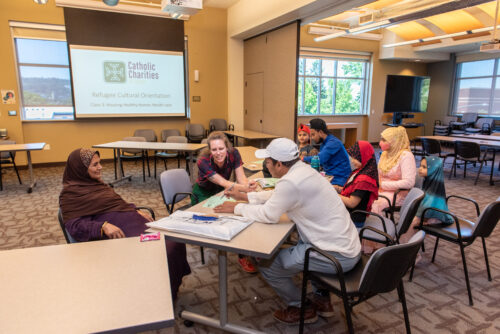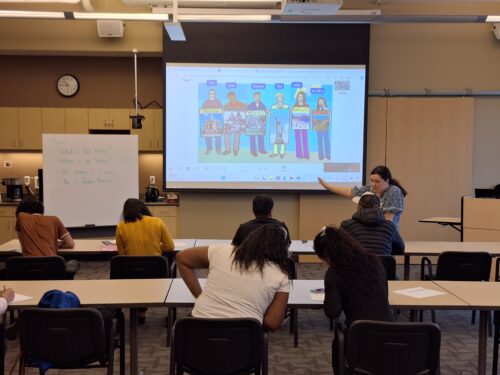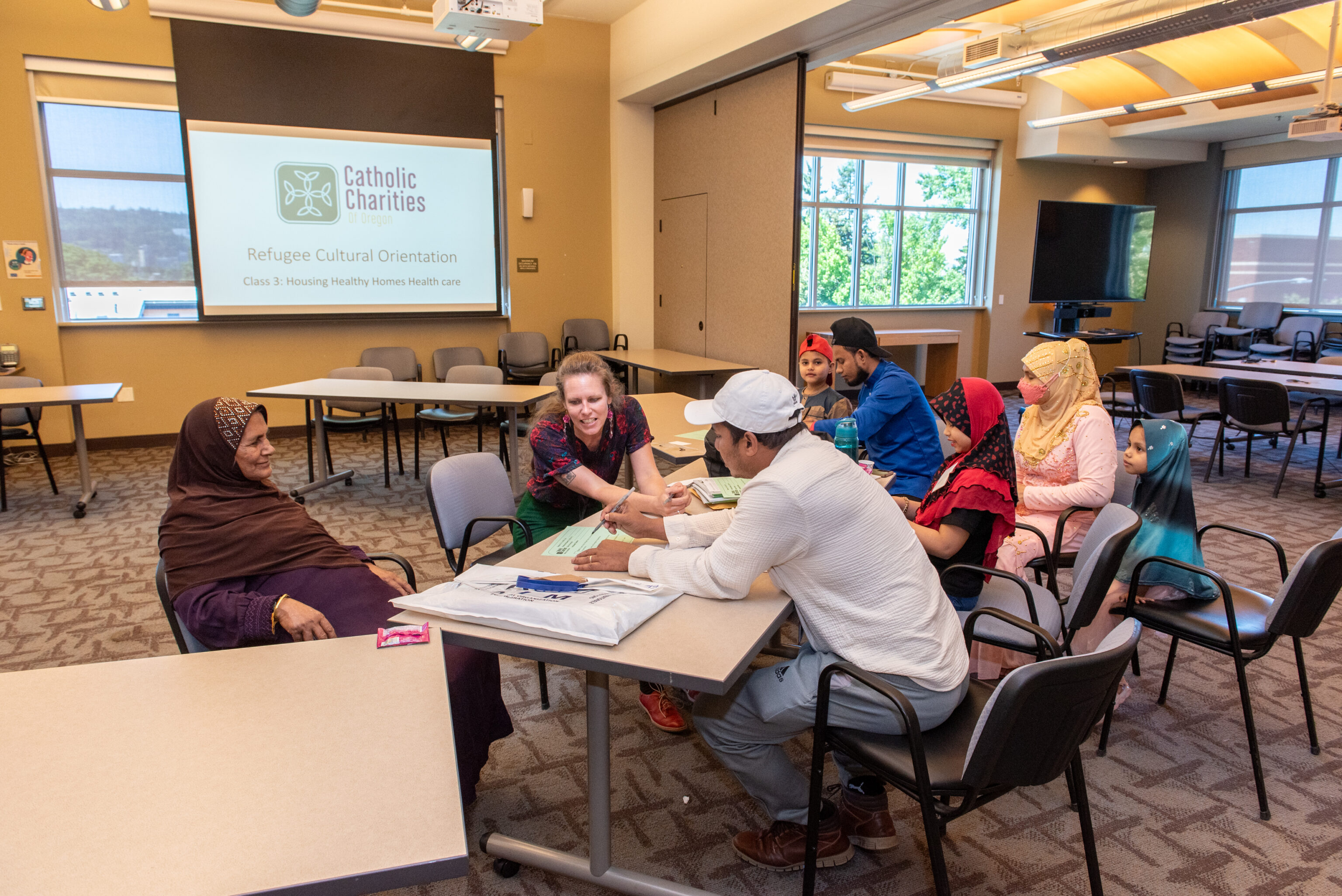When the federal government asks Catholic Charities of Oregon to resettle refugees, housing and food understandably top the list of services. But soon after, Catholic Charities helps refugees begin adapting to Oregon’s culture and language.
Cultural orientation, which is required by the federal government, covers topics like these:
- Budgeting and personal finance
- Diversity and adjustment in Oregon culture
- Digital technology
- Schooling
- Employment
- Health and hygiene
- Housing
- Rights and responsibilities
- Public aid
- Safety
- Transportation
- U.S. law
The classes also can have unexpected benefits like serving as grounds for new friendships, says Tanja Brady, Refugee Services Self-sufficiency Lead for Catholic Charities of Oregon.
One man from Vietnam came to the first cultural orientation class exhausted, probably from long periods of malnourishment and the daze of travel. But by the second class, he was full of life and excitement. He had connected with another Vietnamese man in class, and they became roommates and best friends.

“The two of them were constantly videotaping things — ordinary things — using the bus, walking along the sidewalk, the grocery store, things like that,” says Brady.
The man even felt good enough to become a joker in class. On the last day, Brady took a picture of him in front of the American flag holding up his certificate of completion, his face beaming. Next, he stood behind the podium, and everyone pretended he was the president of his new nation, which thrilled him and got everyone laughing.
Then he turned to Brady and was serious:
“The United States saved my life,” he said. “I owe everything to this country, and I will always be indebted to it. I love this country.”
He and Brady alike teared up.
Cultural orientation – a 12-hour series — covers daily living, including questions such as, “What will my schedule look like?” and “How do I get around town?”
Teachers leave a lot of space so refugees can ask questions specific to their situations.
When it comes to orientation to Oregon, weather is a key topic. Many refugees have never lived somewhere with such dark, wet winters. They receive warm coats, but also advice on staying dry and warm.
Food is another popular topic. Most refugees can cook skillfully from scratch but may have trouble finding the ingredients they like. They also need to be warned about falling into the trap of overly processed foods that dominate U.S. grocery stores.
“The United States saved my life. I owe everything to this country, and I will always be indebted to it. I love this country.”
A refugee resettled by Catholic Charities this year
“In general, refugees dislike canned food,” says Brady, who holds an advanced degree in public health and worked in that field overseas.
She affirms that fresh is better but tells them they should have some cans on hand for emergencies.
Brady advises refugees about farmers markets in their area. Those events not only sell healthy food (and take vouchers) but offer lots of potential friendships, another kind of nourishment. Brady especially urges families to take their children along for relationship building.
“Isolation not good for health,” Brady explains.
Many other details pop up in cultural orientation classes.
For example, refugees from some nations need to understand that in the United States, perhaps especially Oregon, men and women have equal rights in education and finance. Brady says the idea is not to force values on anyone, but to make them aware of prevailing culture.
The course explains that if a woman wears a head covering, people may stare mostly out of curiosity, not animosity. On the other hand, refugees need to learn about the clothing habits of Americans. For example, some newly arrived refugees are scandalized on hot days to see men with their shirts off.
The notion of obligatory schooling for children may be new. Refugees may need to know that some areas have a school bus while others require walking to class, even in the rain.
Refugees in general are not accustomed to homeless people camping in public places and so must learn why this happens.
Quite a bit of work needs to happen on digital literacy, says Brady. Some refugees don’t read or write even in their original languages but must fill out online forms largely in English. It can be daunting.

“They are susceptible to scams as their documents go through systems,” says Brady. “So, they are trained on scams.”
The U.S. health system is confusing even to longtime residents, so that takes quite a lot of talking over. “There are lots of rules here,” says Brady. “That’s good mostly, because there is a lot of order. But you need to get used to it. You need to know, for example, that you need an appointment. You can’t just show up.”
In some countries of origin, law enforcement can be brutal. In cultural orientation classes, Brady explains what police are supposed to be like here and makes it clear that police and military are separate entities.
In partnership with Goodwill Industries, Catholic Charities arranges classes in English as a second language at its Powell Boulevard headquarters, a site the refugees know well. Sending them elsewhere could be confusing.
And staff try to schedule ESL classes on the same day that a food pantry is open next door at Catholic Charities housing. It saves the refugees a trip and gives them yet another place to make friends.
